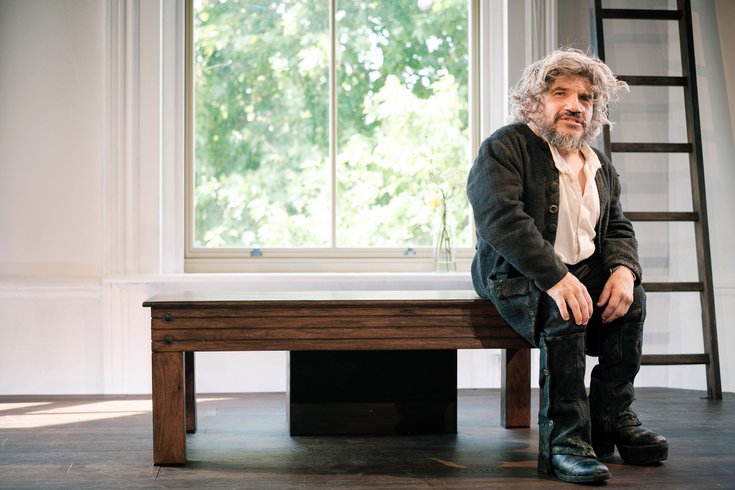
April 21, 2025
 Provided image/Robert Boulton
Provided image/Robert Boulton
'The Return of Benjamin Play' comes to Philadelphia in May after productions in London, Pittsburgh and New York. The one-man show stars Mark Povinelli (above) as the titular Quaker abolitionist.
How do you capture a man who protested slavery so loudly and boldly in 1700s Philadelphia that he was kicked out of his Quaker congregation — an abolitionist who was written off as an eccentric little person but whom history ultimately proved right?
This was the questions that daunted actor Mark Povinelli when he took on the role of Benjamin Lay two years ago. Three productions later, he has a better handle on what made the 4-foot-7 activist tick — though he’s no less impressed.
"It felt like you're trying to almost capture some mythological creature or some fantastical character or some religious icon," Povinelli explained. "Somebody who's sainted, that doesn't feel like a real person.
"It was a little hard to wrap my head around how this man stayed so true to his convictions and held such fervent beliefs."
Povinelli will lead a fourth production of "The Return of Benjamin Lay" at the Quintessence Theatre from May 1-18. The show has played in London, Pittsburgh and New York before, but never in Philadelphia, the site of Lay's most consequential activism. It's a homecoming, in a way, for the long-dead historical figure, who has only recently returned to the public consciousness thanks to the work of historian Marcus Rediker, the play's co-author, and an errant TikTok or two.
Lay's brand of abolitionism was confrontational and spectacular. Most memorably, he strode into the meetinghouse for the 1738 Philadelphia Yearly Meeting of Quakers in a military uniform, disguised under a coat, with a sword and hollowed out book. He condemned slavery as the greatest sin and then pierced an animal bladder of pokeberry juice stashed in his book, spattering "blood" all over the slave-holding congregants.
Lay also kidnapped his neighbor's child to teach a lesson about the cruelty of separating enslaved families. With his friend Benjamin Franklin's help, he published an anti-slavery book called "All Slave-Keepers That Keep the Innocent in Bondage: Apostates" — or, to put it in modern parlance, "Slave Owners Don't Believe in God." His direct actions got him booted from his Quaker congregation, though thanks to his activism, the church eventually voted to disown any member who traded or owned slaves.
Lay's flair for the dramatic naturally lent itself to the stage. After Rediker published his 2017 biography "The Fearless Benjamin Lay," his friend and playwright Naomi Wallace suggested they turn the story into a piece of theater. By the time they had finished their play in 2023, Rediker had also co-authored a graphic novel on Lay, "Prophet Against Slavery." He also has a children's book on the way this fall.
"The different genres are able to do different things," Rediker said. "I'm especially proud of the play because I think it can express deep emotional truths about Benjamin Lay, his life and his causes that no other genre can present."
The co-authors were galvanized by an incident at the House of World Cultures in Berlin in 2017. By Rediker's account, he and Wallace were scheduled to give a joint lecture at the arts center, one they intended to disrupt with an actor portraying Lay. The institute initially endorsed the idea, he said, until the pair pressed to hire a little person for the role.
"This, for some reason, made them very nervous," Rediker said. "They ended up withdrawing, as they put it, withdrawing their support for that part of our presentation. And we said, it's not for you to decide what we will present and what we won't, we consider this censorship. And so we withdrew from the conference, and since we saw that there was a kind of prejudice operating in their minds about little people, as actors among other things, this increased our determination to write the play."
"The Return of Benjamin Lay" made its debut at the Finborough Theatre in London on June 13, 2023. Povinelli, then the president of Little People of America, took on the lead role. The show is set in a Quaker meetinghouse, where Lay is addressing his peers over his expulsion. Though he's asking them to accept him back into the fold, he's still professing the ideas that got him kicked out in the first place — and sharing insights from his remarkable life, which took him from England to Barbados to the Philadelphia region.
"All great classic plays have extraordinary characters at the center," said Alex Burns, the artistic director of Quintessence Theatre. "And Benjamin Lay takes a kind of epic lens. So, whereas most contemporary plays happen in a very concise period of time, or in very realistic spaces, the classics usually traverse the world, traverse time, follow the life of a character."
During the play's three-week run in the U.K., a board member for Quintessence Theatre saw the show and enthusiastically recommended it to the Mount Airy company. Quintessence eventually secured a slot on the mini American tour of "The Return of Benjamin Lay," which recently wrapped stints at the Braddock Carnegie Library in Pittsburgh in February and the Sheen Center for Thought and Culture in New York earlier this month.
Burns saw the show as an opportunity to expand "the idea of the classics." The play is largely based on Lay's historical writings, adapted and expanded into a performance. It all hinges on the show's sole actor, Povinelli, who talks and traverses across the stage for 75 minutes. Reciting the "dense, lyrically beautiful" script night after night, he said, is an exercise in "mental gymnastics."
"That stamina of even just breath control to get through sentences to make sure they make sense, it's not dissimilar to working on Shakespeare," he added.
Finding the humanity in a principled figure like Lay was the other challenge. Povinelli strove to portray him with a humor and warmth that was true to life and balanced his didacticism. Revisions to the play between productions, he said, exposed the complications in the character.
"He's not driven just out of this hierarchical belief in goodness," Povinelli said. "He's driven out of his own demons, that he could be better. He did start to see the comforts and benefits of capitalism and commerce and the slave trade. And he had to fight against that."
In the two years since the play premiered, its creatives have heard frequent comments about it being a show "for the moment." Povinelli remembers it feeling instantly "more visceral" in the United States, particularly as the Trump administration has cracked down on free speech.
"We're living in a moment where it's very dangerous to speak truth to power," Burns said. "We see people being arrested and disappearing for just expressing their opinions and thoughts about politics. Ben Lay was one of those figures. He chose to speak up against the Quaker leaders of Pennsylvania, Philadelphia specifically, and was outcast.
"The impact of being outcast or being removed from a society, I don't think we can quite imagine how impactful that would be to a person in the world at that time. And the implications on them and their ability to survive and live and flourish."
By staging Lay's story in Philadelphia, the production hopes to introduce him to more audiences and maybe inspire others to live a bit like Benjamin.
"I think people who choose to live on that level and are never satiated with their daily lives are epic characters," Burns said. "And I think we need more of them."
Follow Kristin & PhillyVoice on Twitter: @kristin_hunt
| @thePhillyVoice
Like us on Facebook: PhillyVoice
Have a news tip? Let us know.